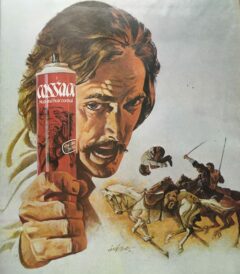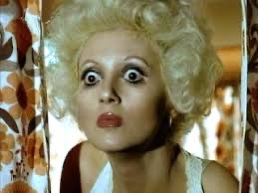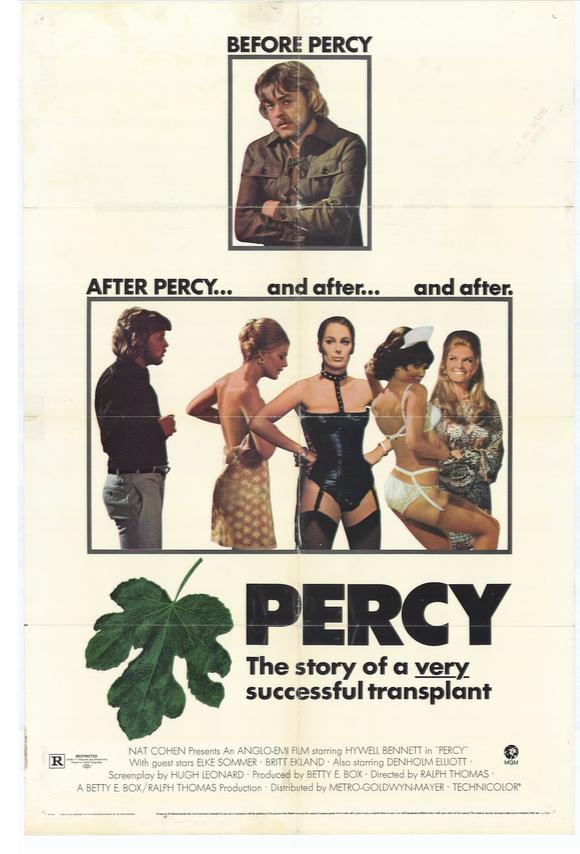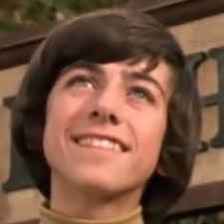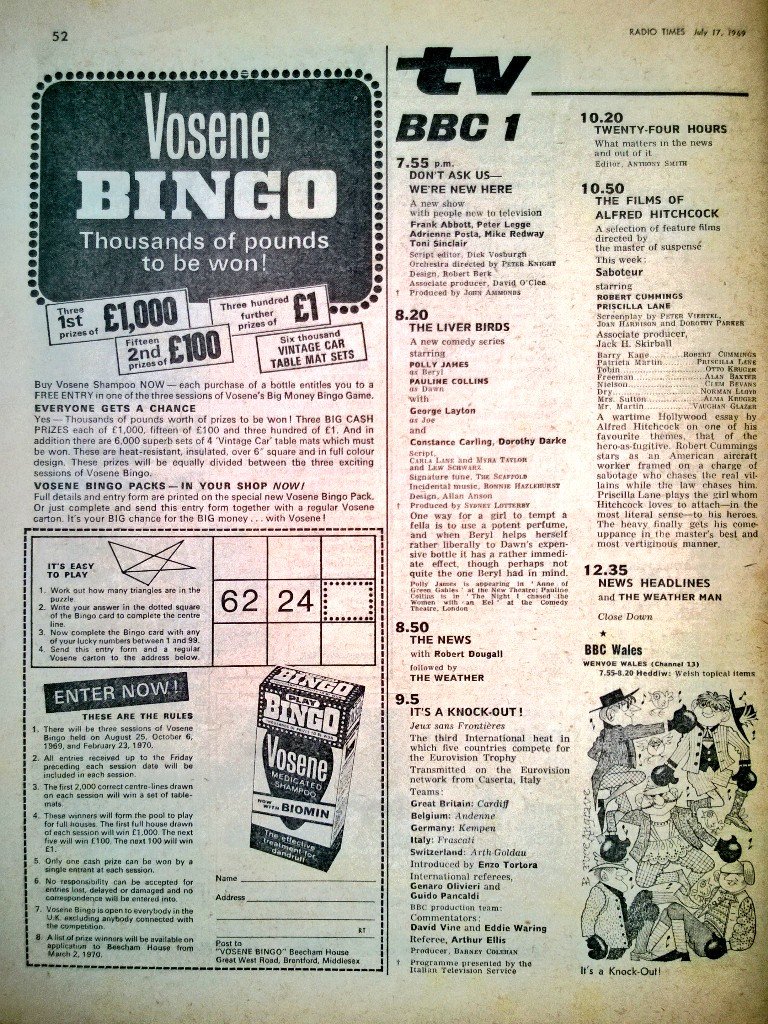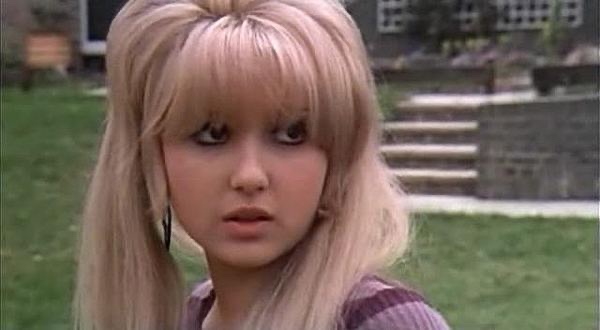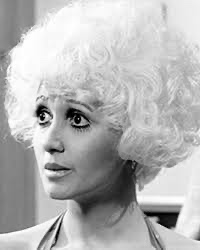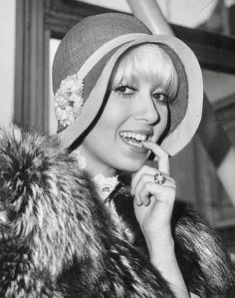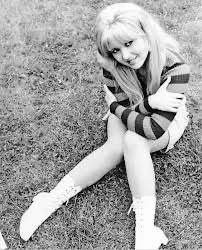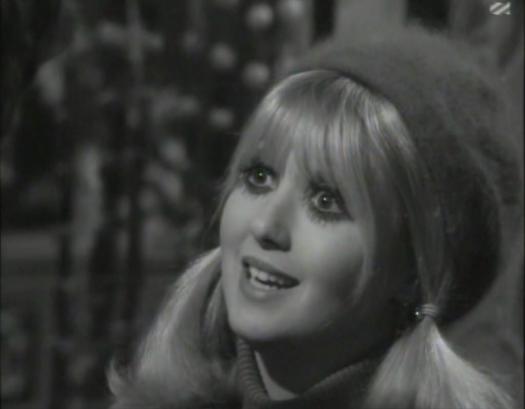Ridiculed today for its most trivial of stories, but was Nationwide really worse than The One Show?
If there is any TV theme music that has me scrambling frantically to find the channel console, it’s that of BBC’s The One Show. A bit like up until the 1970s when the last showing of a film in the cinema was immediately followed with the dirge that is the national anthem and you had to be quick to get out before it started. But one of The One Show’s illustrious predecessors, Nationwide, was broadcast every Monday to Friday straight after the early evening national news. It would begin with the news ‘from your region’ and then we’d go ‘nationwide’ and for the next 40 minutes or so we’d join regular presenters such Michael Barrett, Bob Wellings, Sue Lawley, Frank Bough and latterly, Sue Cook (if she hadn’t pulled out) who would introduce us to news stories which took ‘trivial’ to a whole new level. Yes, they featured important news stories of the time such as football hooliganism, the rise of National Front, The EEC, industrial relations and, one of their favourites, ‘Women’s Lib.’ But it was the trivia that people really wanted and they were given it in spade loads!
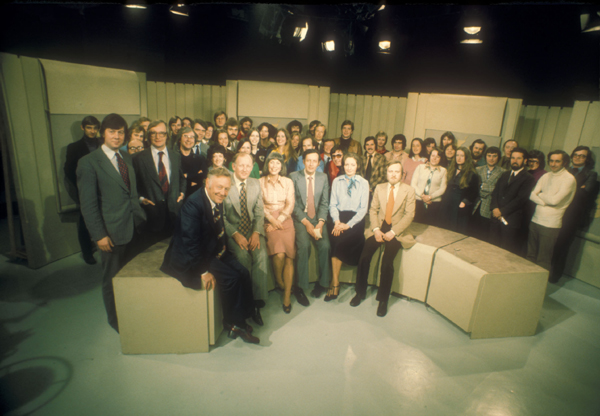
The programme was a minor technological miracle for the time as the presenters were dealing with 12 regional presenters, all being broadcast simultaneously. In the early days cock-ups were inevitable and, in a strange sort of way, the viewing public warmed to the chaos. The producers had maybe predicted this and recruited some stalwart, unflappable professional anchors who would steer the Nationwide ship through the turbulent tea-time waters of multiple simulcasts.
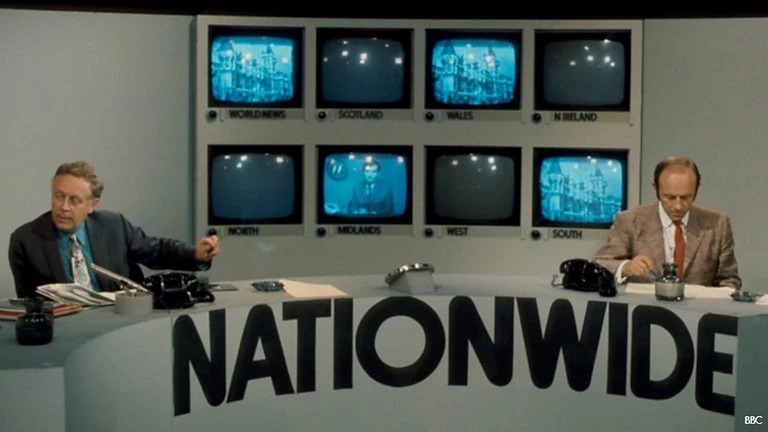
The difference between 70s Nationwide and today’s execrable The One Show is that the former was presented by real journalists. Barrett, for example, had cut his broadcasting teeth on heavyweight news programmes like 24 Hours and Panorama. Bob Wellings, Jack Pizzey, Bernard Falk, Philip Tibenham, Bob Langley and the great Fyfe Robertson were all experienced media hacks and could ‘fill’ during the many moments when things went tits up.
Nationwide had been beamed into our living rooms for well over 10 years before it struck me that maybe it wasn’t considered the serious news magazine programme I had always assumed it to be. The idea that some people took the piss out of its unbalanced menu of serious news and major-league trivia had never entered my juvenile mind. But then I watched a sketch on late 70s groundbreaking satire show Not The O’Clock News and witnessed Rowan Atkinson as a Mr Angry in a TV audience who rants and rails about how rubbish Nationwide is (I’ll tell you a programme I hate. Nationwide! Now that is shit!). I have to say I was shocked. I really hadn’t noticed the ever increasing slide towards its obsession with the minutiae, trivialities and flotsam of everyday British life. That dizzyingly uneasy balance between what was happening in the real world, (IRA, Vietnam, stormy industrial relations, power cuts, rocketing inflation etc), which was really pretty depressing in the 70s, and the Parallel Universe Of Nationwide in the which the exploits of the eccentric, the unusual and even the barking mad were sacrificed at the alter of light entertainment to a salivating tea-time audience.
Nationwide was a live show, a bit like the earlier Dee Time (see Dee Time: When The Sixties Really Began), and therefore, much of the programmes’ prodigious studio output wasn’t recorded or was wiped. Luckily quite a few of their regional ‘stories’ and filmed reports still exist which gives a decent idea of the range and weirdness of its reporting. They’re very much ‘down the rabbit hole’ moments to us now and represent a world that scarcely exists today, which is inevitable of course, and still leave many open-mouthed moments. For example…..
Herbie, The Skateboarding Duck(1976)
If anything summed up a typical Nationwide item it was Herbie. The story included every element so beloved by Nationwide producers: a funny animal, children, something that was ‘trending’ at the time and good old fashioned British weirdness. What’s not to like? And another superb aspect of these regional reports was that, unlike the awful One Show, they sent proper journalists, in this case BBC Midlands intrepid Alan Towers. And what an excellent pun-filled despatch he was responsible for!
Boozy, The Beer Loving Snail (1974)
What? More strange animals with even stranger (regional) people, I hear you say? But yes, this type of story was loved by the undemanding tea-time viewer. Heavyweight journo Michael Barrett can hardly keep the boredom from his voice as he tries manfully to feign interest in a massive snail, Boozy, that drinks beer. Boozy’s regional owner, Chris Hudson from Southampton, is a bit of a card and trades bon mots with Michael Barrett to no great effect, but studio interviews are never quite as exciting as Jack Pizzey, Bernard Falk, Bob Langley, Philip Tibenham or Fyfe Robertson camping it up out on the trail of the weird and the wacky.
Striptease at Tea-time (1969)
No footage exists of a particularly bizarre (this is Nationwide after all) episode which analysed the state of striptease in our 70s permissive society. Why they decided to cover this hardly earth-shattering story at 6pm on a Tuesday evening is anybody’s guess. Maybe the producers thought this item might be ‘relevant’, even ‘daring.’ I remember clearly watching this elaborate but essentially meaningless report. Michael Barrett sat at his desk interviewing a elderly ex-stripper about the job. The interviewee sat on a chair in front of a studio set where a woman went through her stripping techniques, under subdued lights of course. A minute or so into the interview the ex-stripper suggested to Michael he put the studio lights up so we can see how far the stripper had got to in her act. ‘Oh, not at this time of the evening!‘ remonstrates Mike, almost offended. So we had a 5 minute item about stripping but steadfastly did not allow the audience to see the stripper performing, her act kept discretely in the shadows.
Like any tabloid newspaper, Nationwide was not afraid of a bit of prurience disguised as hard-hitting journalism.
The Women of the Pussycat Club (1970)
And talking about prurience disguised as hard-hitting journalism, what about the Women of the Pussycat Club?
Certainly one of my favourite Nationwide items, intrepid reporter Bob Langley was sent along to investigate The Pussycat Club, not in 30s decadent Weimar Berlin but in 70s decadent ..erm… Lincolnshire. An organisation of women, although I’m sure they’d prefer to be known as ‘ladies,’ who believe men are superior to women and should be treated, or rather pampered, accordingly.
This was Nationwide manna from heaven as it coincided with the rise of feminism and ‘Women’s Lib’ as it was referred to at the time. A favourite topic of Nationwide as it certainly stirred up opinions, and Nationwide was nothing if not tabloid in its approach to these type of stories.
The report begins with sexy Alpha male Silverback Jim Cowan arriving home after a hard day’s work to be met by his dutiful wife and leader of The Pussycat Club, Mary-Lou, who repairs him with slippers, newspaper and some delicious home-made banana wine (delicious home-made grape wine is available later in the item). The couple’s conversation seems a tad stilted and one wonders what they talk about when the cameras aren’t around. Probably nothing. Mary-Lou also seems considerably younger than Jim and there’s definitely another story to be told here. A more interesting story might have emerged if intrepid Bob Langley had returned 5 years later to see how the Pussycat Club was progressing (if that’s the right word) and were the pussycats still purring for their ultra-masculine partners?
We then see Mary-Lou sympathetically advising her non-married members (poor souls) the right way to flirt with men by fluttering their eyelids at them, a la Lady Diana or any Jane Austen heroine, before embarking upon the essential feminine skills of embroidery, home perming, and making lip smacking home-made grape wine.
Sadly, if there was a discussion in the studio following the item it has been lost in the mists of time. It would probably have featured Claire Rainer for the prosecution and some female writer from the Daily Mail in the defence camp and would have descended into jokes about women burning their bras.
Strangely you wouldn’t be surprised if a similar report turned up tonight on The One Show. We giggle at such stories but have things really changed that much in the world of tabloid TV?
The Bob Wellings Smoking Scandal
During the mid-70s Nationwide launched an anti-smoking campaign, surprising given the fact that pretty much everyone smoked on telly at the time, so it was really quite groundbreaking. Up to this point cigarettes were not harmful and actually did people some good. At least, according to the manufacturers. To show they were serious about it the staff at Nationwide, from presenters, reporters and behind the camera employees all agreed to give up smoking for a period of time to show it could be done.
One of those admirable individuals was the great Bob Wellings who signed up to this important healthy campaign and blazed the trail for the Great Viewing British Public.
That was until he was caught by an eagle-eyed cameraman hiding a fag behind his back while out filming somewhere in the UK. He was immediately summoned back to BBC TV Centre where he was put into the dock and grilled mercilessly by Head Boy Michael Barrett. Bob was clearly rattled by the revelations and spluttered a sort of explanation/ apology which Barrett was having none of.
He’d let down Nationwide, he’d let down the country, he’d let down the campaign, he’d let down his family and, most of all, he’d let down himself!
Poor Bob, what a turn up for the books.
The Fainting Judge
As if that wasn’t humiliating enough for Bob Wellings he was faced soon after with every presenter’s worst nightmare. Maybe the Gods of Light Entertainment were getting their own back on his shameful smoking behaviour.
While doing an in-the-studio report on the differences between male and female pay (we’re back to that favourite Nationwide tabloid topic again), one of the actors dressed inexplicably as a High Court judge keeled over as Bob approached her. This was text-book Nationwide. Why do a report on differences in gender pay to the camera when you could get a load of actors in from Central Casting to dress up as various high profile occupations and have them stand under the lights in a studio for hours while Bob walks amongst them talking about how much they’re paid? Bob covered himself in glory as he politely stepped over her with a perfunctory comment and carried on the report.
The man was a pro!
Should women pinch men’s bottoms in the street? (1970)
It’s feminism again! Or at least Nationwide’s naughty schoolboy approach to it. But on this occasion it’s naughty schoolgirl, Nicky Woodhead, wearing the fashions of the day, mini skirt and knee-length boots, who stalked the men of London by pinching their bums and asking if it was ok for a woman to do this. Most men thought it was fine, but they would, wouldn’t they?
I’m reminded of Alan Partridge’s radio chat show, Knowing Me, Knowing You on BBC Radio 4, where he insisted his female co-presenter kept her questions light rather than scare off the listening public with anything even remotely in-depth. Nicky Woodhead does not address the issue of whether a man pinching a woman’s bum in the street is at all acceptable. It seems her breezy report accepts that it’s always going to happen, so how do you men like it? Sadly, they really did which defeated the whole point of the report really. And she was a very attractive young woman and not a sweaty, overweight middle-aged man. Although it probably met the male producer’s aims. Even the gay guy in the Afghan coat who sounded a bit like a bit like a Dick Emery character, even although homosexuals officially did not exist in 1970, agreed it was ok.
But this was premium Nationwide: taking what was a fairly serious issue and turning it into a tea-time joke. You could just imagine Michael Barrett and Bob Wellings salivating back in the studio and making lascivious comments about the lovely Nicky being welcome to pinch their bums anytime.
Pipe-smoking Women (1969)
They’re at it again! This time it’s about pipe-smoking women. And the report begins with some glamorous ladies posing in an old-fashioned boozer with their pipes of choice. The late winner in this report is the vox pop of Neanderthal male pipe smokers , some of whom believe it to be unfeminine. ‘Personally I don’t think pipes and mini skirts go very well. The smell might put a fella off.’ It clearly would in a certain area of Lincolnshire. I expect Mary-Lou would be gagging at the very thought. But at least some of the ladies’ pipes have a special mouthpiece so it doesn’t smudge their lipstick!
But credit to the Nationwide reporter. Not a single reference to rough shag or getting your lips around a Churchwarden, although the guys in the studio were probably thinking it.
Tony McCabe: The Manchester Egg-Jumper (1974)
Arguably the greatest item ever featured on Nationwide, and that’s saying something when you check out the entries below. That said, I’d argue there is something greater and more awesome in Nationwide terms yet to come, if you can even imagine that. But let’s not take anything away from Tony McCabe. This is industrial strength Nationwide fodder of quite mind-blowing proportions. Tony reminds me of a character created by the wonderful and much missed Lancashire cartoonist Bill Tidy. He could be one of The Cloggies or a relative of Arctic guide Van Grimshaw in Tidy’s masterpiece The Fosdyke Saga. That’s how good this is.
From the moment Sue Lawley introduces him as ‘a man who can jump on hens’ eggs and human noses without breaking them‘ and we see his professional set-up of basin (why?), towels and a rudimentary double egg-holder, not to mention his egg-jumping outfit of boots and shorts that looked ancient even in 1974, we knew this was going to be something special. And it most certainly was.
Tony took a number of attempts to achieve his aim and mumbled to himself as he put his best boot forward. Fairly long, excruciating seconds of silence ensued in the studio with the off-camera Nationwide presenter desperately trying, but failing, to think of something, anything, to say. Suddenly an almost imperceptible crack, although maybe I just imagined it.
‘That’s it is it? That’s jumping on eggs?”
‘Oh yes, it’s definitely been jumped on.’
Tony McCabe we salute you.
The Amazing Pillar Box Jumping Pensioner (1971)
And if you thought one leaping pensioner was enough to be going on with, you’d be wrong. ‘Jumping’ George Corner had come down all the way from Batley in Yorkshire to fulfil a life-long desire to leap over those double London pillar boxes. ‘At 71 you need something to keep you fit,’ and he’s not wrong there. I have a vague memory that ‘Jumping’ George Corner had previously appeared on Blue Peter leaping over some other inanimate object and had expressed a desire to John Noakes that he’d like to take on a pillar box. Cue Nationwide producer who couldn’t believe his luck to step in and yet another septuagenarian star is born!
Bob Owen: Egg-eating champion of GB.
In 1972 Nationwide Look North presenter, Mike Dornan, took us to Bob Owen’s dark, dingy, soulless and very much male local boozer to show us his not inconsiderable egg-shifting prowess. Pint after pint of raw eggs is knocked back nonchalantly and it seems it’s the viewer that is more likely to evacuate the contents of his stomach than Bob. He then shows-off by sinking a pint of beer in 3 seconds. It’s undocumented as to whether Mike Dornan returned the next morning to see if Bob was still with us or had barricaded himself into a nearby toilet with a bottle of Harpic, but I feel this was just another day at the office for Bob. I also also feel the ladies of The Pussycat Club would have been frothing at the mouth at this display of macho consumption. Wonder if he could have done it with some banana wine?
The Fit For A Queen Silver Jubilee Song Contest

Nationwide steadfastly refuses to go over the top for the silver jubilee song contest
https://www.bbc.co.uk/archive/silver-jubilee-song-contest-1977/z8hckty
But if anything summed up Nationwide’s quest for the weird, the unusual and the downright nuts look no further than the ‘Fit For A Queen‘ Silver Jubilee Song contest of 1977! ‘From hundreds of entries we’ve whittled it down to the best six‘ purred Michael Barrett, although my guess is there were six entries in total. But what a six entries! To watch them today, and they very definitely should be watched, it seems like we’re witnessing something taking place on another planet, although Nationwide regularly had an other-worldly feel to it.
Words like ‘servile’, grovelling’ and ‘sycophantic’ spring to mind as, let’s face it, the BBC, much as I love a lot about it, has always been the media wing of the Royal Family. And if anyone required proof of this, click on the above link, roll up, sit back and enjoy, no doubt with an open mouth, the glory of 70s tabloid TV at its best/ worst, depending on your royal viewpoint..
There’s no need to watch all the performances but three have to be seen to be believed. First up, the colossus that is Eccles’ Eric Smallshaw with The Jubilee Rumba. What the silver jubilee had to do with a rumba is anyone’s, including Eric’s, guess but there’s something quite satisfying about shouting OLE! every time the chorus comes around. Eric’s organist steadfastly never looks up from his keyboards as if he’s terrified some viewer might recognise him and Eric himself almost drifts into paroxysms of ecstasy and his eyes fall back into his head as the song lumbers towards it climax. I have a feeling Eric may have originally written this song about dancing the rumba but, when the call came from Nationwide to submit some grovelling tribute to the queen, Eric played around with some of the lyrics and, lo, The Jubilee Rumba was born!

Eccles’ Mighty Eric Smallshaw
Next up, from Cardiff Richard Gwynn and Cameo taking obsequiousness to new depths with their song ‘Silver Jubilee.’ No one should get too excited expecting a young Larry Blackmon to step out sporting a royal bejewelled codpiece as RG and C are a very different band. Possibly the uncoolest band I have ever seen or heard, and I’ve seen a few. Pray why, I hear you ask? Well, apart from being festooned arse to tit in union jacks, just sample these lyrics, (preferably not on a full stomach):
And may the son you gave us
Bonnie Charles, Prince of Wales
Find happiness on every sea
Wherever he may sail
May every land he visits
Love him just as much as we
And one day we will celebrate
His silver jubilee.
Hang on Rich, just a second ago you were saying the Queen would reign forever and day! And not a trace of irony.
SPOILER ALERT! Neither Eric, sadly, or Rich and his band won the contest. Coventry’s Singing Butcher and a bunch of kids wrestled that dubious honour. But thank god for Nationwide hosting such a musical, and I use this word in its loosest possible sense, oddity. I feel my life would have lacked something had I never stumbled upon this 70s TV gem.
For the record, my vote would, without any doubt, have gone to the redoubtable Eric Smallshaw. I expect Richard Gwynn and Cameo returned to their summer residency in Port Talbot’s Hoseasons camp.
Interview with ‘The’ Led Zeppelin
‘It’s cool, it’s groovy, it’s The Led Zeppelin..
Just to show that Nationwide didn’t just churn out 70s weirdness, it also stuck its finger into the sometimes turbulent waters of the top pops. Although one can’t help but think that this item was featured because some middle-aged producer thought ‘The’ Led Zeppelin sound was so alien that it would upset the taciturn tea-time viewers. And all tabloid reporting is designed to stir up controversy, is it not?
In a bizarre encounter, the great Bob Wellings jousts with chain-smoking Robert Plant and ‘Bonzo’ Bonham. It seems Bob is struggling to get to grips with the popularity of the Led Zeppelin sound and resorts to probing them about how much money they have. You’ve got to get up earlier in the morning if you think you’re going to pull the wool over Robert Plant‘s eyes, Bob. But what an odd and rare TV moment that was and don’t they sound posh? And I wonder if this put the Led Zeppelin boys off interviews for the next 30 years?
Nationwide might have been bizarre, even in the context of its own time, but it was never dull, unlike The One Show which takes lugubriousness to a hitherto unknown level. Interviews on TOS make Alan Partridge interviews seem in-depth.
The Nationwide presenters moved on to pastures new. Shamed presenter Bob Wellings went to Nationwide-on-amphetamines consumer show That’s Life, Bob Langley, Donnie McLeod pitched up at Pebble Mill, Frank Bough to breakfast TV, Sue Lawley to Desert Island Discs and Hugh Scully to Antiques Roadshow, amongst many others.
Michael ‘Mr Nationwide’ Barrett jumped ship early in 1977 after his affair to co-host Dilys Morgan leaked out. He had had cameos as a punk in The Goodies and as ‘himself’ in the legendary 1969 Peter Sellers film ‘The Magic Christian’ (The Magic Christian: The Most 60s Film Ever Made?) and even on the Harry Enfield Smash and Nicey documentary in 1994.
Micheal died in 2022 at the grand old age of 94 having fathered 9 (nine) children.
Now what a great Nationwide story that would have made.
